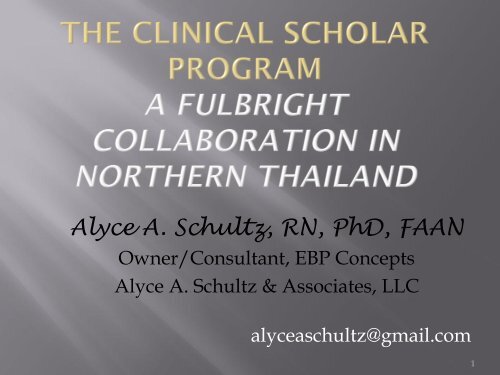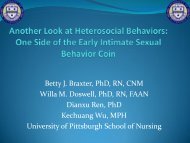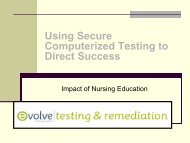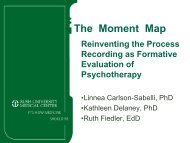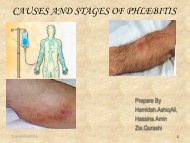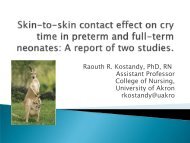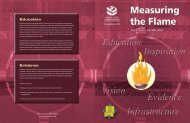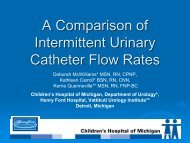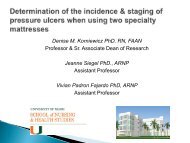Alyce A. Schultz, RN, PhD, FAAN - IUPUI
Alyce A. Schultz, RN, PhD, FAAN - IUPUI
Alyce A. Schultz, RN, PhD, FAAN - IUPUI
- No tags were found...
Create successful ePaper yourself
Turn your PDF publications into a flip-book with our unique Google optimized e-Paper software.
<strong>Alyce</strong> A. <strong>Schultz</strong>, <strong>RN</strong>, <strong>PhD</strong>, <strong>FAAN</strong>Owner/Consultant, EBP Concepts<strong>Alyce</strong> A. <strong>Schultz</strong> & Associates, LLCalyceaschultz@gmail.com1
• Describe the global connections providedby the Fulbright Senior Specialistprogram in promoting nursing scienceand practice.• Discuss application of the ClinicalScholar Program in promoting leadershipskills among nurse clinicians and facultyin northern Thailand for improvingpatient outcomes.2
Fulbright Specialist Program• Started in 2001 to provide U.S. faculty andprofessionals with opportunities to collaboratewith professional counterparts at non-U.S.institutions on curriculum and facultydevelopment, institutional planning and avariety of other activities where the traditionalFulbright Scholarship program did not fit.• Countries eligible to participate in the programinclude those where there is a U.S. embassy ora Fulbright Commission.• Provides short-term grants of 2-6 weeks.4
• To increase the participation of leading U.S. scholarsand professionals in Fulbright academic exchanges• To encourage new activities that go beyond the coreFulbright activities of lecturing and research• To promote increased connections between U.S. andnon-U.S. institutions•Central to the new program, however, is the original Fulbrightpurpose of advancing mutual understanding, establishinglong-term cooperation, and creating opportunitiesfor institutional linkages.6
• Present lectures at graduate and undergraduate levels• Participate in or lead seminars or workshops at overseasacademic institutions• Conduct needs assessments, surveys, institutional orprogrammatic research• Take part in specialized academic programs andconferences• Consult with administrators and instructors of postsecondaryinstitutions on faculty development• Develop and/or assess academic curricula or educationalmaterials• Conduct teacher-training programs at the tertiary levelNote: Personal and clinical medical research as wellas related projects involving patient contact are not allowed.7
Open to qualified U.S. scholars and professionals• U.S. citizen at the time of application. Permanent resident status is notsufficient. If a naturalized citizen, applicant must provide actual date ofnaturalization.• For academics, a Ph.D. or equivalent professional/terminal degree at the timeof application plus a minimum of five years of post-doctoral teaching orprofessional experience in the field in which you are applying.• Sound physical and mental health• For professionals and artists outside academe, recognized professionalstanding and substantial professional accomplishments plus a minimum offive years of professional experience in the field in which you are applying• Fulbright specialists must be residing in the United States at the time they areapproved for a grant and intend to return to their U.S. institution after thegrant's completion.Full application available at www.cies.org/specialists8
• Eligible institutions submit Specialist projectrequests through the appropriate Fulbrightagency in their country. Once approved by theFulbright Commission or U.S. Embassy, theSpecialist project request is forwarded to the U.S.Department of State Bureau of Educational andCultural Affairs for final approval.• The eligible institutions may identify a memberof the Specialist Roster that will meet theirprogram goals or ask the Program to match aspecialist with their needs.9
• The grant period for a project is determined by thehost institution and includes travel days to andfrom the host institution as well as weekends.• Programs can last for 2-6 weeks. Specialist are onlyeligible to participate in 3 programs in 5 years ofappointment.• Grant benefits include international economy faretravel and approved related expenses plus a $200per day honorarium. The honorarium is payableupon completion of the grant and submission of anonline final report and travel expense report. Thesebenefits are paid by the Fulbright Program.• Host institutions normally cover in-country perdiem costs for lodging, meals and transportation.10
• It started with a friendly conversation……• ….someone who knew someone who knewsomeone else who knew how to get it done!!Dr. Rozzano LocsinFlorida AtlanticUniversity11
2006--- Complementing Alliance for Research andEvidence-Based Practice (CARE) was initiated todevelop regional capacity for emphasizing evidencebasedpractice (EBP) in international health; 5 projectswere initiated.2009---Making Evidence and EBP Consultations Accessibleto Practitioners (MEECAP) was added to accelerate theuptake of EBP using a nurse clinician-instructor model.12
• Dr. Lorga and I worked together,with the ongoing support of Dr.Locsin, to match the ClinicalScholar Program©, a series ofworkshops for Evidence Basedguideline development andimplementation by nurseclinicians, to the needs of theMEECAP ProgramDr. Thaworn LorgaDirector ofResearch atBoromrajonaniCollege of NursingNakhon Lampang,Thailand13
An inductive approach thatrequires the support of managementandcultivates the curious, creative, reflectivemindof point of care nursesStrout, T. D., Lancaster, K., & <strong>Schultz</strong>, A. A. (2009). Nursing Clinicsof North America, 44, 93-102.In addition to the first international conference on QualitativeResearch held in Chiang Rai, December 3-5, 2010, we completedTHREE workshops series of 6 workshops each.
©Series of Six WorkshopsDr. Prissana NaunboonruangDr. Thaworn Lorga
Select innovations or changes that are:•High volume, high risk, highfrequency, high cost•Observable to others that the changewill make a difference
Patient• Nosocomial infectionrate for urinary tractinfection• Fall• Skin integrityStaff• Nursing staffing• Nursing hoursSatisfaction• Satisfaction with healtheducation information• Satisfaction with painmanagement• Satisfaction with generalnursing care• Nursing staff satisfactionKunaviktikul, W., Anders, R. L., Chontawan, R. et al. (2005). Development of indicators toassess the quality of nursing care in Thailand. Nursing and Health Sciences, 7, 273–280
Will an evidence-based guidelineimprove pain management in olderadults through the use of anappropriate risk assessment scale?Marisa Suwanraj <strong>PhD</strong>, <strong>RN</strong>Boromarajonani College ofNursing Songkhla
Pressure UlcersWill adding a nutritional supplement•to the turning protocol reduce•the incidence of pressure ulcers?•How do you know that all nurses stage pressure ulcers correctly?•What is the inter-rater reliability among nurses in their use of theBraden Scale or whatever scale you are using to predict patients atrisk for skin breakdown?•At what Braden Scale score, do you order expensive pressurerelievingdevices or beds?
• High level of curiosity• Critical thinker• Continuous learner• Reflects on experience• Seeks and uses widespectrum of resources• Uses evidence to improveeffectiveness ofinterventions• NEVER STOPS ASKINGWHY?
• Have a Vision that excites and convertspotential followers• See the big picture• Constantly sell and model that vision• Work to convince others but recognizeand accept that there will be failuresand course corrections along the way• Create trust• Charismatic; believe in themselves• Always visible in leading the vision• Can be counted on to lead the charge• Unswerving commitment• Provide lots of praise and rewards
• Does evidence-based diabetic education improveHbA1c, fasting blood glucose, patient and familyknowledge, and reduce complications?• Will an evidence-based guideline reduce the incidenceof foot ulcers and amputation in patients with diabetes?• Will empowerment of patients with diabetes enhanceself-care and knowledge?• Will an evidence-based guideline reduce urinary tractinfections in patients with long-term indwellingcatheters?• Will the use of aseptic technique and separate flushingsets reduce catheter-associated urinary tract infections?
• Will evidence-based criteria for hospitaladmission for women in latent and active phaseof labor reduce prolonged Stage 1, birth asphyxia,and pain and improve patient satisfaction?• Will the addition of an evidence-based guideline forbreastfeeding in pre-term infants (32-35 weeks) improveoutcomes?• Will an evidence-based guideline for hypothermia maintainthe body temperature and reduce hypoglycemia in pre-terminfants and improve parent satisfaction?• Will an evidence-based asthma management program forchildren reduce ED visits, hospital admissions, and selfefficacy?
• Will an evidence-based education programreduce pain and improve knowledge in patientswith osteoarthritis of the knee?• Will the use of an alcohol withdrawal protocolreduce the use of physical restraints and injuriesfrom restraints in trauma patients?• Will an evidence-based guideline improve the outcomesfor patients with head injuries during transfer?• Will a circuit therapy program improve the quality of lifein patients who experience a stroke?
• 90 nurses in Northern Thailand participated in the 3 series.• 39 new evidence-based clinical practice guidelinesaddressing nurse-sensitive quality indicators were initiated.• 24 hospitals and schools of nursing.
Questionsalyceaschultz@gmail.com27


